CHICAGO – Patrick McDonald of HollywoodChicago.com appears on “The Morning Mess” with Dan Baker on WBGR-FM (Monroe, Wisconsin) on March 21st, 2024, reviewing the new streaming series “Manhunt” – based on the bestseller by James L. Swanson – currently streaming on Apple TV+.
Interview: Steve McQueen, Michael Fassbender Turn ‘Shame’ Into Art
CHICAGO – Writer/director Steve McQueen and actor Michael Fassbender have the kind of interview dynamic that only comes with two people who know each other very well. They broke through with the same film, 2008’s “Hunger,” a masterpiece of human drama. Since then, Fassbender’s career has skyrocketed and any list of the best working actors that doesn’t include him is incomplete.
In particular, 2011 has been amazing for the star of “Fish Tank” and “Inglourious Basterds.” It started with the underrated “Jane Eyre,” moved to the best superhero movie of the summer in “X-Men: First Class,” and will end with a one-two punch of “Shame” from McQueen (opening Friday, December 2nd) and David Cronenberg’s “A Dangerous Method” (open in some markets and in Chicago on December 16th). The cherry on the sundae will be Steven Soderbergh’s “Haywire” next month.
Of all of this work, “Shame” may be Fassbender’s greatest accomplishment. In a role certainly deserving of Oscar consideration, Fassbender plays Brandon, a functioning sex addict. He may get by at work but his home life is a sad, desperate existence, one that’s up-ended when his sister (Carey Mulligan) comes to town.
The incredible actor and his talented director sat down with me recently in Chicago to discuss controversy, city living, collaboration, and even a potential sequel to “First Class.”
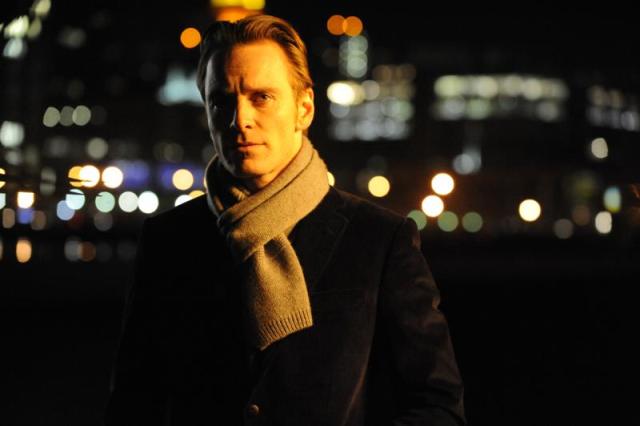
Shame
Photo credit: Fox Searchlight
HollywoodChicago.com: Whenever there’s two such artistic successes, I’m always curious about how the collaborative process works. So let’s start there. Steve, do you write the piece with Michael in mind?
STEVE MCQUEEN: No, I don’t. He doesn’t need my help. I don’t tailor for anyone. It’s not like, “Oh, Michael can do THIS.” If that was the case, I would make it so different from him completely that he would have space to act in it. I don’t think it’s wise to do that. It’s just got to be true to the actual character, not true to the actor.
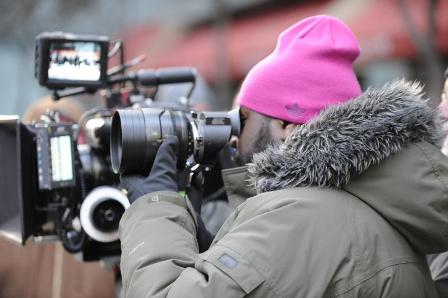 Shame Photo credit: Fox Searchlight |
HollywoodChicago.com: Once he is attached, what kind of collaboration is there in pre-production — background, character detail, even dialogue? Michael, what are you allowed to input?
MICHAEL FASSBENDER: He doesn’t really allow for collaboration. It’s what he says, goes, and that’s it. We’re not allowed to talk. And we’re not allowed to actually move. We have seats with our names in them and, when we arrive, we have to sit in our seats and not speak to each other. Or Steve. (Laughs.)
MCQUEEN: Not in my eyeline.
FASSBENDER: (Laughs.) It’s definitely collaborative. There has to be somebody in charge, for sure, and that’s the director. And he’s steering the ship and looking after all the departments. So you try not to bother a director. Only when absolutely necessary. We talk about stuff but, mainly, we get stuff on its feet. We go for something. We test something. We try something. It’s by doing. We meet up and workshop. We’re getting the feel for things and getting some chemistry.
MCQUEEN: Not even for too long. Two days. And then I had to stop it. It was too good. With Carey, it was a little more work since I have a relationship with Michael. With him, we don’t actually talk much. It’s very odd. Often it’s a grunt or a moan. Or an OK. I’ll walk over to tell him something and he’ll go, “I know,” and I walk back. It’s not expected and I’m happy it exists.
HollywoodChicago.com: Isn’t that unusual? Have you had that with other directors?
FASSBENDER: I’ve had, for sure, experience with directors where you understand each other but this is different. I’m more involved in this relationship. I learned so much from the experience I had on “Hunger.” On how I should approach things as an actor and what I’m looking for and loads of things that I can’t put my finger on. It was a relationship that meant so much to us.
MCQUEEN: It’s kind of like growing up together.
FASSBENDER: We just really know each other. It’s honest and easy.
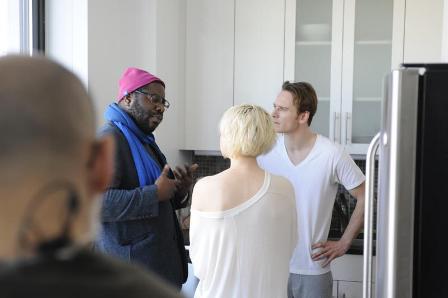 Shame Photo credit: Fox Searchlight |
HollywoodChicago.com: How much unseen do you guys work on? Background, character history?
MCQUEEN: Again, it’s all in the script. It’s research. Of course, we introduced Michael to people who had this affliction. We can do as much as we can with the script but he does his own research.
HollywoodChicago.com: You did your own research?
FASSBENDER: Yeah. Of course. You want to be armed with as much information and knowledge as possible. If you can meet somebody, that’s a great thing to do. What do you take from that meeting then? In general, I like to tell stories and I like to hear stories. So you just sit and listen. And you listen to stories and you realize it’s real, it’s relevant to everyone, and this isn’t a scenario of a guy with a raincoat and sweaty palms. These are successful, able-bodied people that you could be at work with. You realize that when you’re dealing with addiction that there are faces and masks that the addict has to wear. These are interesting, thoughtful, intelligent people, aware of their condition. You hear devastating stories. In particular, for this character, it was the idea of intimacy. How can you have trouble with it? I heard one man’s story and we were grateful for him telling us his story and I got insight into the crux of Brandon’s problem.
HollywoodChicago.com: Do you share with Carey any discussed history between the characters?
FASSBENDER: We all talk.
MCQUEEN: We all talk but it’s very light. These are two different people. We have different angles on their lives and backgrounds. I don’t like to talk too much about that stuff. I like to give the information with the character. Get on with it.
FASSBENDER: You gather the information and then you throw it away. Life itself is f**king weird. People do strange things. You might think too much. Odd behavior is odd behavior. You don’t want to go, “Brandon would never do that.”
MCQUEEN: You give them ammo. Actors take what they want and leave what they want.
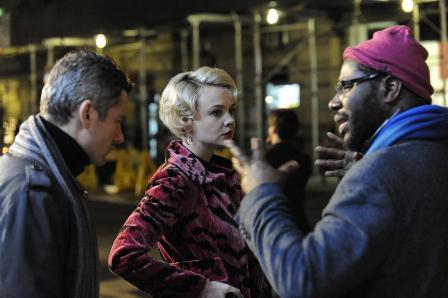 Shame Photo credit: Fox Searchlight |
HollywoodChicago.com: How is Carey different from other actresses who might have played the role?
MCQUEEN: She wanted it. She found the script and wanted to meet me. There was a real want, a real need, a desperation. I liked that. That’s how Sissy would behave. I gave her the role on the spot.
FASSBENDER: You need to dance with someone who’s courageous and smart enough.
MCQUEEN: I knew I was working with two of the best of their generation, no doubt.
HollywoodChicago.com: I love the use of the city in the film. New York is a major part of the production. First, do you agree with that?
MCQUEEN: Yes. But by circumstance. The movie was supposed to be made in London but no one wanted to work with us in London. At that time, there was a lot of stuff in the medium about sex addiction. People were tight-lipped. We came to New York and spoke to two people who were experts in the field. Our worlds were turned around by talking to them. And, while we were talking to them, it was like, why not set the movie in New York?
HollywoodChicago.com: I guess London would have been similar but there’s something about shooting through glass as often as you do and the coldness of the pavement.
MCQUEEN: Yes. I think that’s interesting. As you were saying before, a lot of people in New York live and work in the sky. That perspective through the window maximizes solitude in a way. There’s always the wide world out there.
HollywoodChicago.com: And, as you were saying, the hidden lives that people have in a society where everyone is always on top of one another. I thought that was important to the story.
MCQUEEN: What people say, what people don’t say. What’s going on underneath is a very different thing.
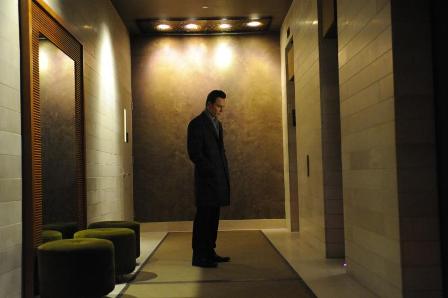 Shame Photo credit: Fox Searchlight |
HollywoodChicago.com: You faced a little controversy in London when you were trying to get it off the ground. I don’t want to talk too much about the nudity/controversy, but I do have one question — did you know when you were making it that you would have a controversial film or do you not think that far ahead?
MCQUEEN: Doesn’t cross my mind. I’m making a story about being a human being and that’s it.
HollywoodChicago.com: You spoke about how much you learned on Hunger and since then, can you think how this would have been a different had you made it first? Before Hunger?
FASSBENDER: You never know these things. Who knows? We’re both people who are very passionate about what we do. It’s simple. We would have come up with something. It’s an impossible question to answer. On “Hunger,” we had one argument on day one. And, even still, if we go head-to-head it’s for the benefit of the piece. For “Hunger,” it was probably opening day nerves. It’s about working together.
MCQUEEN: It’s a catalyst. We made a stand. And we had trust. We listened to each other. We had an argument in “Shame” and Michael was correct. We changed it. It’s all about being sensitive and listening.
HollywoodChicago.com: You talk about how hard you work — “Jane Eyre,” “X-Men: First Class,” “Shame,” “A Dangerous Method.” How does a year like that click into place?
FASSBENDER: Basically, it just sort of happens. “Jonah Hex” was the last thing I did in 2009 and that was done in May or June of that year. I didn’t do anythiing for the rest of that year. Then it kicked off in February of 2010 with “Haywire” straight into “Jane Eyre” straight into “Dangerous Method,” “X-Men,” “Prometheus,” “Shame,” and now I’ve stopped again. It just sort of happened. Films shift. They move. Their start dates do. So, when a lot of them are happening, you take the opportunity. It’s too attractive to let it pass. That’s the way it sort of unfolds.
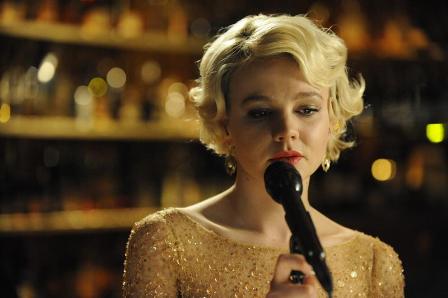 Shame Photo credit: Fox Searchlight |
HollywoodChicago.com: What most attracts you to a project? Your character, the themes/plot of the overall piece, or your collaborators?
FASSBENDER: I only read MY character. (Laughs.) It’s not funny, is it? Hopeless. It’s a combination of things. You read a lot of the same thing under different names. You see patterns and formulas that repeat themselves.
HollywoodChicago.com: But if it’s got Soderbergh or Cronenberg’s name on it, that changes things.
FASSBENDER: Of course. It’s the story and it’s the director. It’s that simple.
HollywoodChicago.com: You two plan to work together again?
MCQUEEN: Next year. It’s called “Twelve Years of Slave.”
HollywoodChicago.com: What’s that about?
MCQUEEN: A guy who was kidnapped into slavery.
HollywoodChicago.com: Would you do another X-Men movie?
FASSBENDER: I have to. I’m contracted. To be honest, I’d be excited to. I’m looking forward to it if it happens. I’m not sure. I haven’t heard any word definitively. I met with James [McAvoy] just before I came over here and we were both saying that we’d like to sit down and see what was going on. We’ve got some interesting ideas.
“Shame” opens on December 2nd, 2011.
 | By BRIAN TALLERICO |


